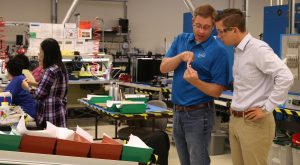
By Tab Wilkins
There’s no question the digital manufacturing revolution is racing at us. As a small or medium-sized manufacturer, how close are you to already being “smart”? Here are five steps in the journey to becoming a smarter digital enterprise.
First and foremost, be cybersecure. Cybersecurity is an underlying tenant of being a smart and trusted business partner. The more you rely on a digital platform for manufacturing, the more secure you’ll want to be for customers, suppliers and investors. The NIST MEP website has several cybersecurity resources for manufacturers to help on this quest.
Second, understand smart manufacturing. Two formal definitions come from the National Institute of Standards and Technology and the Smart Manufacturing Leadership Coalition(link is external). Essentially, it is the idea of integrating all your technology together for monitoring, management and improvement. An excellent blog post by Steven Brand of the California Manufacturing Technology Consultants (CMTC), the California MEP, goes into this in some detail as it relates to small and medium-sized manufacturers(link is external) and even offers a downloadable version of CMTC’s Guide to Smart Manufacturing.
Third, realize there’s likely to be “flow down” through any supply chain. Most large manufacturers and retailers, both in the U.S. and around the world, are investing in smart technologies, according to a recent report by the Capgemini Group and its subsidiary Sogeti, entitled Smart Factories: How can manufacturers realize the potential of the digital industrial revolution?(link is external)They found 76 percent of larger manufacturers have a smart manufacturing initiative, while 56 percent have invested $100 million or more in the last five years. As larger companies invest and deploy, smart manufacturing is likely to permeate the supply chain, like the way just-in-time, lean, and ISO 9000 requirements became a stated or de facto requirement.
Fourth, research the current state around you. For example, the Georgia MEP, GAMEP, co-sponsors a study every two to three years about Georgia manufacturers. Smart Manufacturing: The 2016 Georgia Manufacturing Survey shows that 49 percent of Georgia manufacturers electronically collect and analyze data for improvement. Pages 10 and 11 of the report illustrate specific technologies and rates of adoption, such as RFID for inventory and warehouse tracking, or software for scheduling, inventory control or purchasing (e.g. ERP). Which of the 20 technologies listed in the report have your competitors already adopted?
Fifth, take an inventory and benchmark your smart status. Are you using computer-aided design technology and is it integrated with your computer numerical control equipment? Are you using a manufacturing resource planning or enterprise resource planning software system? Is your preventive maintenance kept electronically and are sensors used in your manufacturing processes? Some of these represent the basic building blocks of being smart and mean your company might be close. The next step is connecting and integrating these elements for data access and monitoring. Look on page 10 of the Capgemini Smart Factories report identified earlier and see if you are a Digital Master, Fashionista, Conservative or Beginner in smart manufacturing.
If after understanding smart and benchmarking your company you’d like further help, please contact the Utah MEP Center. They have additional assessments, tools, advice and counsel on how to invest wisely in this impending wave of Technology 4.0.
Article originally appeared here
Tab Wilkins is Regional Manager for Strategic Transition and Senior Technology Advisor at NIST MEP, primarily supporting Centers in the western US. Prior to joining NIST, Tab
 helped establish and run two MEP centers and has a varied background in non-profit management, leadership development and technology-based Economic Development.
helped establish and run two MEP centers and has a varied background in non-profit management, leadership development and technology-based Economic Development.









